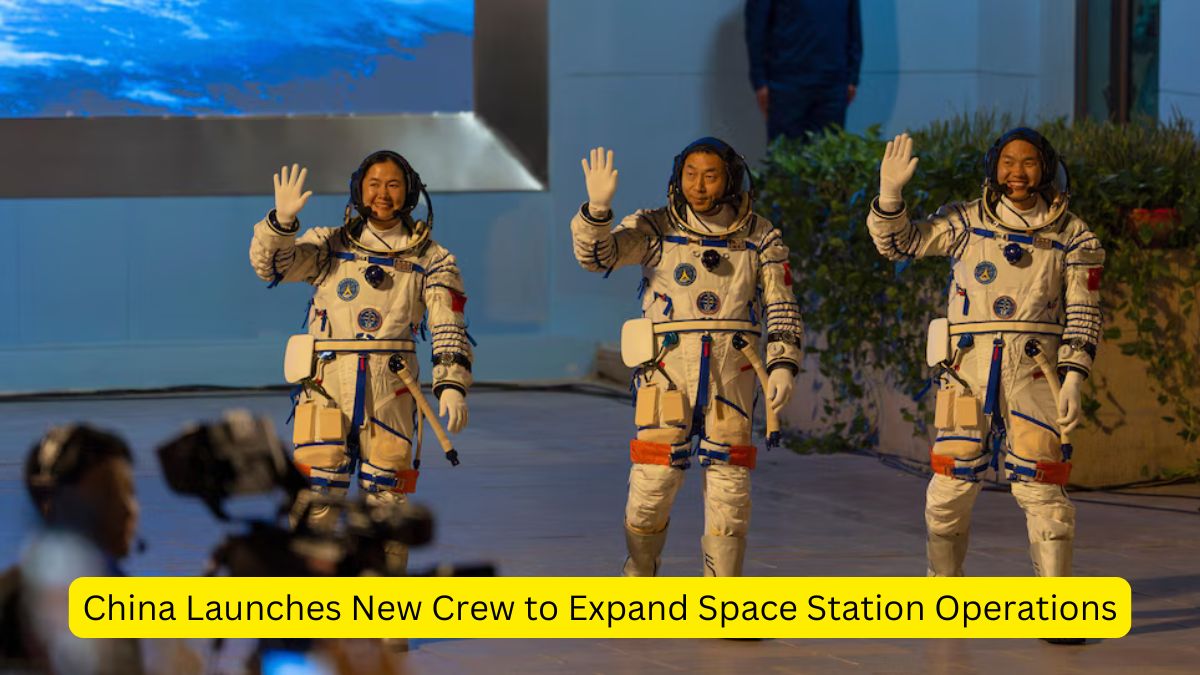China successfully launched a new spacecraft carrying three astronauts, including the country’s first female space engineer, on a six-month mission. This crew will work on fine-tuning operations at China’s low-orbit space station, marking a significant step in the country’s advancing space exploration efforts.
Launch Details
- Vehicle: Shenzhou-19 crewed spaceship aboard a Long March-2F carrier rocket.
- Location: Jiuquan Satellite Launch Centre, northwest China.
- Launch Outcome: Shenzhou-19 separated from the rocket around 10 minutes post-launch, reaching its designated orbit. CMSA confirmed all crew members are in good health, marking the launch as a success.
Mission Highlights
- The crew will conduct a 6-month mission to fine-tune China’s low-orbit space station.
- The Shenzhou-19 will perform a fast, automated rendezvous and docking with the space station’s Tianhe core module within 6.5 hours of launch.
- Once docked, it will form a complex structure with three modules and three spacecraft.
Crew Composition and Responsibilities
Astronauts
- Mission Commander: Cai Xuzhe.
- Astronauts: Song Lingdong and Wang Haoze.
- Wang Haoze is China’s first female space engineer and third female astronaut in a crewed mission, responsible for space experiments, cargo management, and station operations.
Assigned Tasks
- Conducting space science and application tests.
- Performing extravehicular activities (EVAs) and installing protection against space debris.
- Managing installation and recycling of extravehicular equipment and payloads.
Mission Objectives and Scientific Experiments
The crew will conduct 86 experiments across diverse fields,
- Space life sciences.
- Microgravity fundamental physics.
- Space material science.
- Space medicine and new technologies.
International Collaboration
- China plans to include astronauts from partner countries on future missions.
- A Pakistani astronaut is anticipated to join upcoming missions, enhancing China’s partnerships in space exploration.
China’s Space Station and Future Space Goals
Space Station
- China’s space station is currently the only one in orbit not part of the International Space Station (ISS) consortium.
- Observers speculate that, with the ISS nearing potential retirement, China’s station may soon become the only operating station in low-Earth orbit.
- The station features robotic arms capable of satellite capture, which have drawn global attention.
Planned Space Expansion
- Manned lunar missions and a lunar space station.
- Exploration of habitable planets and extraterrestrial life.
- Recent achievements include a lunar probe mission that brought back samples from the moon’s far side.
| Summary/Static | Details |
| Why in the news? | China Launches New Crew to Expand Space Station Operations |
| Launch Details | Vehicle: Shenzhou-19 crewed spaceship aboard Long March-2F rocket.
Location: Jiuquan Satellite Launch Centre, northwest China. Outcome: Successful launch, spacecraft reached orbit 10 minutes after launch. |
| Mission Duration | 6-month mission to fine-tune operations at China’s low-orbit space station. |
| Mission Objectives | 86 experiments in:
– Space life sciences – Microgravity physics – Space material science – Space medicine and new technologies. |
| Assigned Tasks | Conducting space science experiments, extravehicular activities (EVAs), and space debris protection. |
| Crew Composition | Commander: Cai Xuzhe.
Astronauts: Song Lingdong, Wang Haoze (China’s first female space engineer). |




 Made in India: Nadda Launches Indigenous...
Made in India: Nadda Launches Indigenous...
 Reliance Announces ₹10 Trillion AI Inves...
Reliance Announces ₹10 Trillion AI Inves...
 GalaxEye’s AI-Powered OptoSAR Satellite ...
GalaxEye’s AI-Powered OptoSAR Satellite ...








